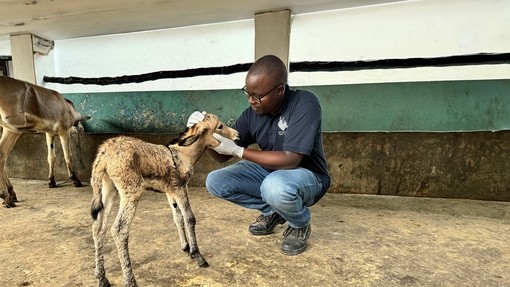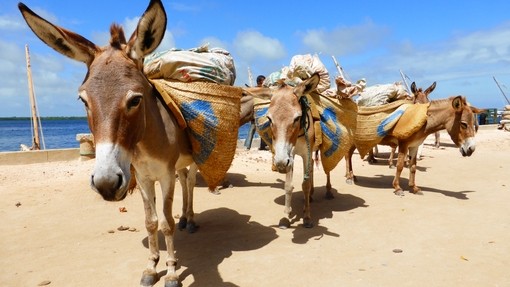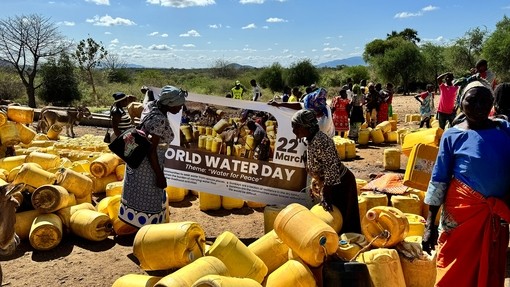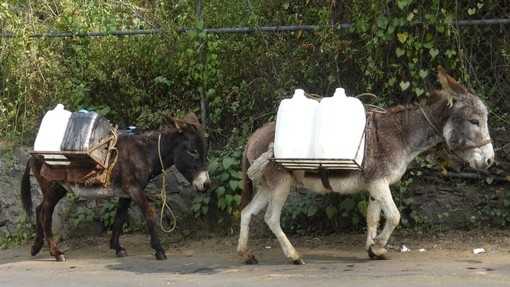
International working animal day
Estimates suggest there are more than 50 million donkeys in the world. The vast majority of these donkeys live and work in low-income countries around the world, often in challenging environments where their welfare suffers.
One particular place where donkeys are a lifeline for the community is Lamu Island, located off the east coast of Africa. Here, and across the surrounding archipelago where there are virtually no cars, people rely greatly on working donkeys as the sole means of transport and to earn a living and feed their families.
Situated on the edge of Lamu Old Town, our clinic provides vital veterinary care to donkeys in Lamu, as well as giving expert welfare advice to their owners. It also serves as an office for our Lamu programme and as a base for a wide range of projects designed to improve the the health and welfare of donkeys in Lamu and the surrounding islands.
Obadiah Sing’Oei, Lamu Programme Manager and Clinic Lead, and his team play an invaluable role in the wellbeing of communities who rely on their donkeys. While their primary aim as veterinarians is to improve the welfare and reduce the suffering of donkeys on the island – by educating people about good donkey welfare and helping them to care for their animals – the team is also protecting one of the community’s most vital lifelines.

Bernard Owuor lives in the coastal community of Manda-Maweni on Manda Island, just across a short strait from Lamu Island. Like their neighbours on Lamu, residents rely on donkeys for their livelihoods, and their welfare is supported by Obadiah and his team from the Lamu clinic.
Bernard works as a coral cutter. In the intense heat of the day, he chips large blocks out of the ground in open quarries, which is then transported by his donkeys to the coast. From there it is shipped to the nearby Lamu Island, or to the Kenyan mainland where it is used in the construction industry.
Coral cutting began in 1982 when just six people came from Mombasa to start the work removing the material. The blocks are cut from dead coral reefs, a reminder that the area was once covered by the ocean. Now a significant industry in Manda, the quarrying of stone blocks offers employment opportunities for many people on the island, as well as jobs for people in the connected construction industry across the archipelago.
Bernard explains: “The women break the coral rock into small pieces and pack it in used cement bags where it is used as ballast, while the men cut it into different sizes – small, medium and large.
“Our positions have changed; men used to pull the carts, but now donkeys are used to pull them.
“Donkeys are the gamechanger, because what we once had to do alone, the donkeys can now do quicker and they are able to carry more”
The residents’ donkeys on Manda not only transport the coral building material, but they are also used to help fetch firewood from the forest and carry water from the wells back to the village.
Bernard continues: “The donkeys raise money for the families who were very poor, but they can now pay school fees and maybe keep something for their clothes. This has really changed the economy of the place.
“Everybody in the village appreciates donkeys, and we are working to change the habits of how people treat donkeys, and to accept donkeys as part and parcel of our economy today.
“The donkeys have really changed the entire village into something else. Something that we never had before.
“Nowadays we call ourselves the donkey family.”
Dr Solomon Onyango, Country Director for The Donkey Sanctuary in Kenya, said: “This is an excellent opportunity to mark and appreciate the crucial role donkeys play in enabling communities to achieve various Sustainable Development Goals.
“Without donkeys most of these communities will be greatly impoverished. We therefore call upon the communities and the governments to safeguard these animals, especially against the illegal bush slaughter for their skins, and ensure that their welfare is well cared for.”
Our Lamu clinic has been providing support to donkeys and the communities that rely upon them for more than 35 years. Now, with the addition of two new vets, and a robust community outreach programme, we will be able to reach more donkeys across the archipelago to help improve donkey welfare.
Learn more about our work in Africa
Share this page
Tags
- News







